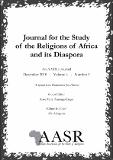| dc.description.abstract | The African novelist Ngugi wa Thiong’o in his novel A Grain of Wheat introduces a female character Mumbi. Mumbi resides in a village of pre-independence Kenya and shares the same name with the first woman in the Agikuyu myth of origins. In the novel, her life story brings to the centre stage religious, sexual and gender politics in the realm of everyday life. Whilst her husband Gikonyo is in detention, she gets pregnant by Karanja. Upon his release, Gikonyo swears never to talk about the child, continue with life as if nothing had happened, but never enter Mumbi’s bed. Eventually out of frustration, he becomes violent to Mumbi to the extent that she leaves him to return to her parents. Using narratological text analysis and the sexual scripting approach, this paper examines Mumbi’s sexuality in the context of her traditional village deeply immersed in Agikuyu traditional religion to explore the dilemmas of women’s autonomous sexuality in African traditional societies. Sexual scripts existing at the Agikuyu traditional societal level are contrasted with those arising from both the interpersonal and intrapsychic levels in order to examine processes of transitions related to family, Agikuyu religion and sexuality and how Mumbi adopts new ways of negotiating sexual life. | en_US |

